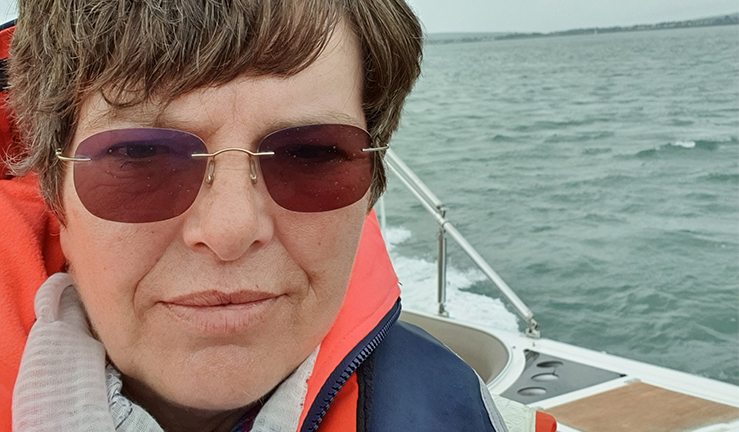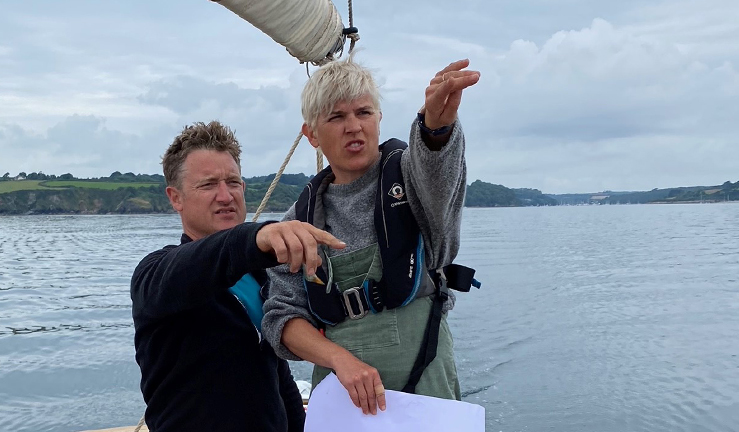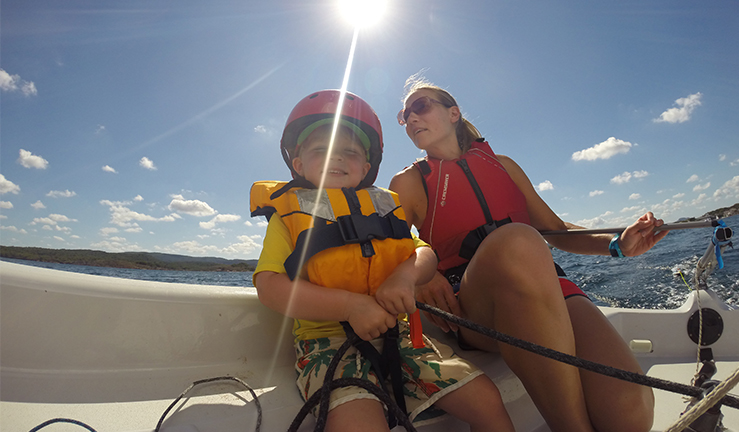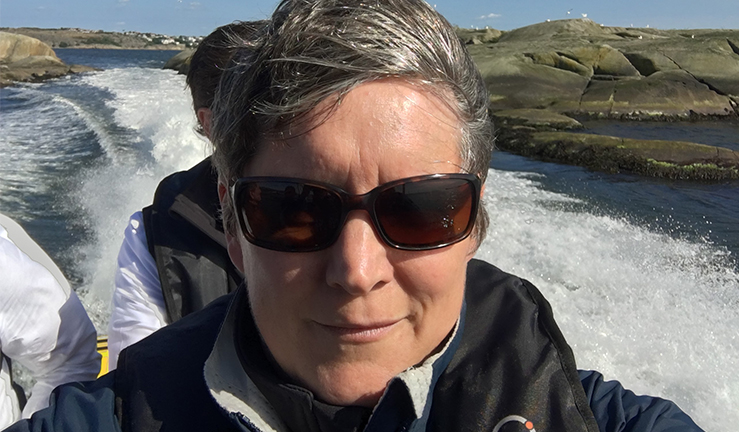Steering the course
The RYA has once again joined organisations across the globe to take part in World Sailing’s Steering the Course festival celebrating women in sailing. During the 10-day social media takeover we will be sharing stories of female instructors, coaches and volunteers from across the UK, as well as the women in the British Sailing Team. Raising awareness of the opportunities and pathways available to women in watersports and boating.
Here we speak to some of the women within the RYA’s training network to find out more about their stories, motivations and the barriers they’ve encountered along the way...
Making waves
Julie Proudfoot, Yachtmaster Cruising Instructor Trainer and Examiner (Power)

Julie’s father owned a 43ft Princess which she learnt to helm before he upgraded to a 52ft motor cruiser. She recalls clocking up the miles and her experience on this boat, going on adventures like visiting Cherbourg for lunch!
She took the Coastal Skipper/Yachtmaster Offshore Theory course and really enjoyed it, passing her Yachtmaster exam shortly after. When her father sold the boat, she was keen to continue and sent a number of emails to try and obtain work. Only three responded, but she didn’t give up and secured a paid delivery trip, collecting a boat from Reedham in Norfolk and bringing it back to Hamble with the owners.
“Mostly people were supportive and helpful at the beginning, although some were dismissive because I was female,” she explains. “At the start I was always having to prove myself, but it’s not such a problem now.”
A few years later Julie took her Yachtmaster Instructor course, but was so nervous she received an action plan. She decided to retake the course and to just enjoy it, passing with flying colours. At the time she was the only female RYA Yachtmaster Instructor Power in the UK. Today there are a number more.
Acknowledging it can be difficult area to get into, she suggests the best way to get started in power is to crew and contact delivery companies and schools, building your skills through different boats. She also emphasises the need to be confident in what you teach. For Julie, having a lot of practical experience was a real help.
“I’d love to see more female instructors on the power side – the industry could do with more!”
Breaking barriers
Lara Bonney, Yachtmaster Cruising Instructor Trainer and Examiner (Sail)

As a child Lara was obsessed with boats but recalls her first barrier was trying to convince her mother to let her learn to sail. She eventually agreed on the condition that Lara swim a mile before she could take part! Which she did.
She started sailing regularly at her local club following a ‘come and try sailing’ event. A hugely positive experience with inspirational volunteers. She was given an old Optimist for her 9th birthday and enjoyed sailing locally, but her family didn’t have the finances to take her further afield and in her teens she lost interest, struggling to find a dinghy to suit her 5ft frame.
Having learnt to sail around the Bristol Channel and South West Wales, there wasn’t much of a yachting scene, but inspired by sailors like Dame Ellen MacArthur and having won tickets to the Southampton Boat Show, her eyes were opened to a whole new world on the water - yachting.
She took a professional crew and skipper course at college, covering a broad spectrum of subjects from naval architecture to mechanical engineering, which stood her in good stead for the rest of her career. And when she was 18-years-old she joined a boat in the Azores and was hooked, staying on and crewing for the rest of the summer.
At this stage she started crewing as much as she could and whilst she says this was a great experience, being female did make it tricky. “I tended to be overlooked with people speaking to male crew members instead of me. Even when I was the skipper,” she explains.
For anyone thinking of weaving a career in the industry, Lara says it isn’t without challenges: “Balancing a home life with sailing is difficult, with lots of hours needed.
“But the most rewarding part is giving people the ability to enjoy themselves, and freedom and capacity in a way that they are not used to. They can use the skills learnt for what they want. Whether that be sailing socially with loved ones and knowing how to keep them safe, or sailing around the world!
“I get real enjoyment from helping others to gain confidence and see the possibilities that sailing can create for them.”
Changing priorities
Amanda Van Santen, Chief Instructor of the RYA’s dinghy and windsurfing training schemes

Amanda comes from landlocked Buckinghamshire and got into watersports on school activity holidays in France and Spain.
“I’ve always been an avid water person,” she explains. “I come from a really academic family and when university didn’t work out for me, RYA training gave me a pathway and the qualifications to get into an industry I loved.”
Amanda gave up her place at university and instead took a 12-week course to teach sailing, windsurfing and kayaking. She loved it and developed a passion for coaching others. She started seasonal work as a watersports instructor, travelling to Maui and Australia in the winter to develop her own skills.
“The biggest barrier at the beginning was knowing that the watersports industry even existed,” she explains. “Its really hard not to go through University when it’s the norm, and it’s a shame that alternative pathways like watersports aren’t more widely known. The seasonal work can also be disheartening when you’re first starting out.”
After meeting her future husband, Amanda moved back to the UK and had her first encounter with the RYA, becoming a Windsurf and Dinghy Trainer. Shortly afterwards she interviewed for her current role, initially just running the RYA Windsurf scheme, but later covering the National Sailing schemes too.
When she got married and had her first son everything changed. “Finding that work/life balance was hard,” she explains. “I had to come away from being on the water and instead chose to prioritise my career. I picked up some of the sports I did as a child such as running, swimming and cycling, which I could fit in more easily with bringing up my children.”
Once her second son was about two-years-old she got fully back into being on the water, though still finds balancing work and family life challenging. She says: “Although I missed being on the water, I knew it would always be there and by taking those three years out, it took the pressure away. I don’t think people are necessarily aware of the flexibility and support that’s there if you need it.”
Standing out from the crowd
Rachel Andrews, Chief Instructor of the RYA’s power schemes

Rachel discovered her love of outdoor activities when studying French and Swedish at University. Her placements took her to France, where she worked at an activity centre in the Alps, before going to Sweden then Japan – taking every opportunity to get outside and go snowboarding or exploring at the weekends.
Back in the UK she did a six month ‘Zero to Hero’ course in dinghies, windsurfing, kayaking, climbing and hill walking – this was her first introduction to the RYA.
One of the biggest challenges in the early days was the seasonal nature of the work, with social pressure to get a ‘proper job’. “Not many people see this industry as a career that can progress, and most only do one or two seasons” she explains, noting that this is particularly the case for women who tend to seek more stable careers.
Even though she was working full time and progressing in the industry, Rachel wanted to continue to develop her skills, and have a backup plan, so she studied for a PGCE in the evenings to teach in further education (16+). As her career progressed, she continued to develop her knowledge and skills, taking on higher level and rarer qualifications including becoming a Powerboat Instructor, Trainer and Sea Survival Instructor.
She says: “It’s worth thinking about development and what you can do to stand out from other candidates. For me, languages and my teaching qualification provided great talking points with prospective employers.
“When I was doing my instructor courses, females were under-represented and I was often the only one,” she explains. “Today women are better represented and having women on the training delivery team for the Powerboat and Personal Watercraft Trainer courses and revalidations is something I’ve focussed on. Making changes to the selection system to remove some of the pressure and encourage candidates to perform at their best.”
For anyone thinking about the industry as a career path, Rachel advises keeping an open mind and saying yes to opportunities, as they may open doors.
“The work/life balance can be hard, particularly at the start. But ultimately instructing is a very rewarding career and you can have a real impact, particularly for young people. The skills learnt through being on the water can go beyond the boating, helping people develop broader life skills such as communication, which make a real difference in the future”.
RYA support
In March, the RYA launched the Equality, Diversity and Inclusion Strategy 2021-2030, setting out the Association’s aims and actions for the coming years, including gender diversity. Find out more about the strategy here.
For more information about the RYA instructor and trainer pathways and opportunities within the RYA’s training network visit – rya.org.uk/training/teaching
